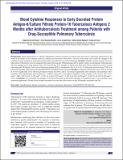| dc.description.abstract | Background: Human tuberculosis is a chronic inflammatory disease caused by mycobacterium tuberculosis. Pulmonary tuberculosis is the result of the failure of host immune system to control mycobacterium tuberculosis. The aim of the study was to asses the changes of the cytokines in active pulmonary tuberculosis patients before and after the use of anti-TB therapy. Methods: Multiple cytokine responses in active tuberculosis (TB) patients were investigated in this study following anti-TB drug therapy after 2 months. Ninety-six participants with pulmonary TB were engaged in the study between May 2018 and October 2018. Samples of blood were taken early before treatment at 0 and 2 months after using anti-TB therapy. The levels of interferon-gamma (IFN)-γ, interleukin-4 (IL-4), IL-6, IL-10, and tumor necrosis factor (TNF)-α in whole blood plasma collected from the QuantiFERON-TB Gold Plus were measured. Results: Compared with baseline levels, TNF-α, IL6 and IL10 were significantly lower following treatment whereas the IFN-γ and IL-4 increased significantly after treatment. The responses of five cytokines varied significantly after treatment (P < 0.0001) where IFN-γ was highest compared to other cytokines with 123.6%, AUC=0.757 and P < 0001, TNF-α AUC: 0.529 and P = 0.743, IL-4 AUC:0.557 and P = 0.514, IL-6 AUC:0.629 and P = 0.047, IL-10 AUC:0.549 and P = 0.581. Conclusion: It is concluded that changes of cytokines that observed during the treatment of TB patients play a very important role in monitoring pulmonary TB and can be suitable biomarkers to assess the effectiveness of anti-TB therapy in patients with TB. | |

